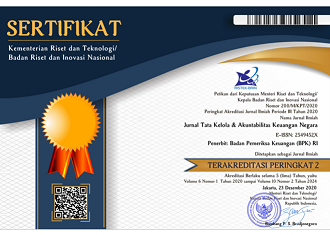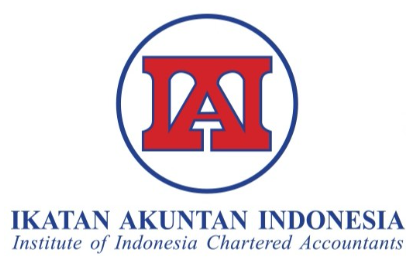The Effect of Financial Audit Guidelines and Fraud Detection Awareness on Quality Audit Results During the COVID-19 Pandemic
DOI:
https://doi.org/10.28986/jtaken.v8i1.842Keywords:
pandemic, fraud, financial statements, quality audit, COVID-19Abstract
Many elements of society have experience disadvantages as a result of an array of problems in financial reporting. Given the preceding situation, a financial statement audit conducted by the auditor as an independent party is expected to achieve reliable audit quality. However, under the current situation of the pandemic, the auditor faced numerous challenges that have never been encountered before in carrying out audits. An Auditor must be more creative in conducting audits and comply with audit standards. The possibility of fraud risk in financial audits is also greater during the pandemic. This study aims to explain the role of financial audit guidelines and fraud detection awareness in providing quality audit results during the COVID-19 pandemic. This research was conducted upon auditors of BPK Representative of East Java province who were involved in financial audits. There were 91 respondents involved in this study. The research method applied multiple regression data analysis with the Partial Least Squares (PLS) approach through the help of the SmartPLS 3.0 program. The study would produce financial audit guidance variables and fraud detection awareness that will significantly positively affect quality audit results.
References
ACFE. (2017). Fraud examiners manual 2017 international edition. Austin: ACFE.
ACFE., & Thornton, G. (2021). The next normal: Preparing for a post-pandemic fraud landscape. Retrieved from https://www.acfe.com/uploadedFiles/ACFE_Website/Content/covid19/Covid-19-Preparing-for-a-Post-Pandemic-Fraud-Landscape.pdf
AICPA. (2020). Consequences of COVID-19 potential auditing challenges. Retrieved from https://future.aicpa.org/resources/download/consequences-of-covid-19-potential-auditing-challenges
Akrimi, N., & Borders, N. (2021). The impact of coronavirus pandemic on audit quality: The perceptions of Saudi. Academy of Accounting and Financial Studies Journal, 25(2), 1–7.
Albitar, K., Gerged, A. M., Kikhia, H., & Hussainey, K. (2020). Auditing in times of social distancing: The effect of COVID-19 on auditing quality. International Journal of Accounting and Information Management, 29(1), 169–178. DOI: 10.1108/IJAIM-08-2020-0128
Albrecht, W. S., Albrecht, C. C., Albrecht, C. O., & Zimbelman, M. (2009). Fraud examination (3rd Edition). Boston: Cengage Learning.
Bollen, L., Mertens, G., Meuwissen, R., van Raak, J., & Schelleman, C. (2005), Classification and analysis of major European business failures. London: European Contact Group.
BPK RI. (2009). BPK Decree Number 3 Year 2009 concerning the Implementation Guidelines for the Quality Assurance System (Keputusan BPK RI Nomor 3 Tahun 2009 tentang Petunjuk Pelaksanaan Sistem Pemerolehan Keyakinan Mutu). Jakarta: BPK RI.
BPK RI. (2017). BPK Regulation Number 1 Year 2017 concerning State Financial Audit Standards (Peraturan BPK RI Nomor 1 Tahun 2017 tentang Standar Pemeriksaan Keuangan Negara). Retrieved from https://www.bpk.go.id/ page/standar-pemeriksaan-keuangan -negara
BPK RI. (2020a). BPK Decree Number 4 Year 2020 concerning Technical Guidelines for Financial Audits in Emergency Conditions (Keputusan BPK RI Nomor 4 Tahun 2020 tentang Petunjuk Teknis Pemeriksaan Keuangan Pada Masa Darurat). Jakarta: BPK RI.
BPK RI. (2020b). Regulation of the Secretary General of the BPK RI Number 22 of 2020 concerning State Finances Audit Method in Emergencies (Peraturan Sekretaris Jenderal BPK RI Nomor 22 Tahun 2020 tentang Metode Pemeriksaan Keuangan Negara dalam Keadaan Darurat). Jakarta: BPK RI.
BPK RI. (2021). Summary of Semester Audit Results I Year 2021 (Ikhtisar Hasil Pemeriksaan Semester, IHPS I Tahun 2021). Retrieved from https://www.bpk.go.id/ihps
Carcello, J. V., Vanstraelen, A., & Willenborg, M. (2009). Rules rather than discretion in audit standards: Going-concern opinions in Belgium. Accounting Review, 84(5), 1395–1428. DOI: 10.2308/accr.2009.84.5.1395
Deis, D. R., & Giroux, G. a. (1992). Determinants of in audit quality the public sector. The Accounting Review, 67(3), 462–479.
Efendy, M. T. (2010). Pengaruh kompetensi, independensi, dan motivasi terhadap kualitas audit aparat inspektorat dalam pengawasan keuangan daerah. (Unpublished Master's thesis). Diponegoro University, Semarang, Indonesia.
FRC. (2020). Guidance for auditors and matters to consider where engagements are affected by Coronavirus (Covid-19). Retrieved from https://www.frc.org.uk/getattachment/ae0044e3-a7bf-4b75-8aa2-4e39e20f525b/Bulletin-Coronavirus-Guidance-December-2020.pdf
Ghozali, I., & Latan, H. (2015). Partial least square - konsep, teknik dan aplikasi menggunakan SmartPLS 3.0 untuk penelitian empiris. Semarang: Badan Penerbit UNDIP.
Hair, J. F., Hult, G. T. M., Ringle, C. M., & Sarstedt, M. (2017). A primer on partial least squares structural equation modeling (PLS-SEM). New York: Sage Publishing.
Harahap, D., Suciati, N. H., Puspitasari, E., & Rachmianty, S. (2017). Pengaruh pelaksanaan standar audit berbasis International Standards on Auditing (ISA) terhadap kualitas audit. Jurnal ASET (Akuntansi Riset), 9(1), 55. DOI: 10.17509/jaset.v9i1.5444
Hassink, H., Bollen, L. H., Meuwissen, R. H. G., & de Vries, M. J. (2009). Corporate Fraud And The Audit Expectations Gap: A Study Among Business Managers. Journal of International Accounting, Auditing, and Taxation, 18(2), 85–100. DOI: 10.1016/j.intaccaudtax.2009. 05.003
Hassink, H., Meuwissen, R., & Bollen, L. (2010). Fraud detection, redress, and reporting by auditors. Managerial Auditing Journal, 25(9), 861–881. DOI: 10.1108/02686901011080044
Hay, D., Shires, K., & Van Dyk, D. (2021). Auditing in the time of COVID – the impact of COVID-19 on auditing in New Zealand and subsequent reforms. Pacific Accounting Review, 33(2), 179-188.
Henseler, J., Ringle, C. M., & Sarstedt, M. (2015). A new criterion for assessing discriminant validity in variance-based structural equation modeling. Journal of the Academy of Marketing Science, 43(1), 115–135. DOI: 10.1007/s11747-014-0403-8
IAASB. (2020). Highlighting areas of focus in an evolving audit environment due to the impact of COVID-19 (Issue March, pp. 1–4). International Auditing and Assurance Standards Board. Retrieved from https://www.iaasb.org/publications/highlighting-areas-focus-evolving-audit-environment-due-impact-covid-19-1
IAPI. (2013). Standar Audit 240: Tanggung jawab auditor terkait dengan kecurangan dalam suatu audit atas laporan keuangan. Retrieved from http://spap.iapi.or.id/1/files/SA 200/SA 240.pdf
IAPI. (2020). Respons auditor atas Pandemi COVID-19: Terhadap laporan keuangan, prosedur audit, dan pertimbangan praktis penunjang kualitas audit. Retrieved from https://iapi.or.id/uploads/article/76-TECH_NEWSFLASH_APRIL_2020.pdf
Kadhafi, M. (2013). Pengaruh independensi, etika dan standar audit terhadap kualitas audit Inspektorat Aceh. Jurnal Telaah & Riset Akuntansi, 6(1), 54–63.
Lowensohn, S., Johnson, L. E., & Elder, R. J. (2005). Auditor specialization and perceived audit quality, auditee satisfaction, and audit fees in the Local Government audit market. Journal of Accounting and Public Policy, 1271(970), 1–37. DOI: 10.1016/j.jaccpubpol.2007.10.004
Ningsih, F., & Nadirsyah. (2017). Pengaruh independensi, skeptisisme profesional auditor, penerapan standar audit, dan etika audit terhadap kualitas hasil audit (studi pada auditor BPK RI Perwakilan Provinsi Aceh). Jurnal Ilmiah Mahasiswa Ekonomi Akuntansi, 2(3), 48–58.
Othman, R., Aris, N. A., Mardziyah, A., Zainan, N., & Amin, N. M. (2015). Fraud detection and prevention methods in the Malaysian Public Sector: Accountants’ and internal auditors’ perceptions. Procedia Economics and Finance, 28(April), 59–67. DOI: 10.1016/s2212-5671(15)01082-5
Porter, B. (1993). An empirical study of the audit expectation-performance gap. Accounting and Business Research, 24(93), 49–68. DOI: 10.1080/00014788. 1993.9729463
Saleem, K. S. M. A. (2021). The impact of the coronavirus pandemic on auditing quality in Jordan. International Journal of Innovation, Creativity, and Change, 15(4), 31-40.
Setiawan, S., Tridig, B. S., Gunawan, Y., & Sari, D. S. (2020, September). The effect of information technology audit on the audit quality in detecting fraud using the competence of the auditor as a moderation variable. ACM International Conference Proceeding Series ICIBE 2020: 2020 The 6th International Conference on Industrial and Business Engineering (pp. 141–145). New York: Association for Computing Machinery. DOI: 10.1145/3429551.3429572
Siregar, S. V., & Tenoyo, B. (2015). Fraud awareness survey of the private sector in Indonesia. Journal of Financial Crime, 22(3), 329–346. DOI: 10.1108/JFC-03-2014-0016
Suprajadi, L. (2009). Teori kecurangan, fraud awarness, dan metodologi untuk mendeteksi kecurangan pelaporan keuangan. Jurnal Bina Ekonomi, 13(2).
Suyanto. (2009). Fraudulent financial statements, evidence from Statement on Auditing Standard Number 99. Gadjah Mada International Journal of Business, 11(1), 117–144. DOI: 10.22146/gamaijb.5539
Widarjono, A. (2015). Analisis multivariat terapan - dengan program SPSS, AMOS dan Smart PLS. Yokyakarta: UPP STIM YKPN
Zulhaimi, H., Apandi, R. N. N., & Sofia, A. (2016). Kualitas audit dan reporting aggresiveness studi pada periode awal penerapan International Standard on Auditing (ISA). Jurnal ASET (Akuntansi Riset), 8(2), 69–77. DOI: 10.17509/jaset.v8i2.13714
Downloads
Submitted
Accepted
Published
How to Cite
Issue
Section
License

Jurnal Tata Kelola dan Akuntabilitas Keuangan Negara is licensed under
a Creative Commons Attribution-ShareAlike 4.0 International License




















